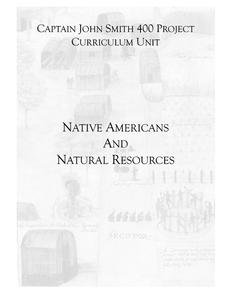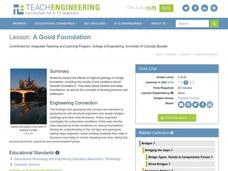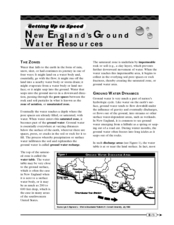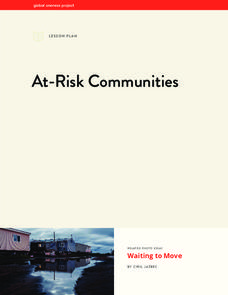Cal Recycle
Conserving Natural Resources
Trying to plan an engaging elementary science unit on natural resources? Conserve your energy! This five-part series of lessons and hands-on activities has exactly what you need to teach young scholars about the importance of conservation.
Curated OER
Native Americans and Natural Resources
North American Indian civilizations had already been in place for over 10,000 years before the arrival of European settlers. Introduce your young historians to Indian tribes that lived in the Chesapeake region in the early seventeenth...
Teach Engineering
A Good Foundation
It takes a strong foundation to build a house and a stronger one for a bridge. This resource presents the effects of geology and soil on bridge foundations. Working in groups, the class investigates the interaction of shallow and deep...
Global Oneness Project
Protecting Wilderness
Would you live in a tree for three years to protect a redwood forest? Viewers of Rainhouse Cinema's Among Giants documentary consider the actions of Earth First! environmental activists who moved into the treetops of a grove of giant...
Environmental Protection Agency (EPA)
New England's Ground Water Resources
Learn all about where ground water is stored, how it moves, and how it is accessed in a detailed and thorough 10-page reading. Whether supplementing reading for an existing environmental or earth science course or providing background...
American Forest Foundation
Who Speaks for the Trees?
Help young conservationists appreciate the important role that trees play in ecosystems around the world with this collection of six engaging activities. From a shared reading and class discussion of Dr. Seuss' The Lorax, to in an depth...
Teach Engineering
Dirty Decomposers
Do not let the class just sit and rot. Pupils learn how decomposition and nutrient recycling is important to an ecosystem. Groups design an experiment to determine how environmental conditions affect decomposition. They develop a poster...
NASA
Erosion and Landslides
A professional-quality PowerPoint, which includes links to footage of actual landslides in action, opens this moving lesson. Viewers learn what conditions lead to erosion and land giving way. They simulate landslides with a variety of...
Global Oneness Project
At-Risk Communities
"Waiting to Move," a photo essay by Ciril Jazbec, brings into sharp focus the threats posed by climate change. Class members examine images of Shishmaref Island and the Native Alaskan Inupiate coastal villages that are impacted by rising...
California Academy of Science
Discovering Rainforest Locations
How many rainforests are there, where are they, and do global factors effect their locations? These are great questions that have great answers. Children in grades four through eight use several different maps to determine why...
Kenan Fellows
Making Connections with Water Quality
What's in your water? And, why is water quality so important? Enhance your class's level of water appreciation through a lesson that demonstrates the necessity of water quality. Environmental enthusiasts explore the EPA's Clean Water...
Rainforest Alliance
How Do Jaguars and Howler Monkeys in Belize Depend on Us?
How does weather play a role in the lives of land and sea creatures? Find out with a instructional activity focused on habitats and the ways animals from different homes are connected. Here, learners explore how the life of a jaguar and...
Wilderness Classroom
Pollution
Educate scholars on pollution—air, water, and land—with a series of lessons that begin with a thorough explanation of each type. Learners then take part in three activities to reinforce the importance of reducing pollution. They...
Teach Engineering
Extinction Prevention via Engineering
It's time to save endangered species through engineering. The third lesson in a nine-part Life Science unit has young environmentalists study species extinction. An engaging discussion leads to some ideas on how to use engineering design...
Teach Engineering
Capillarity – Measuring Surface Tension
How do cohesion and adhesion work together? The third installment of a nine-part series teaches young scientists the difference between adhesion and cohesion. They also learn how cohesion and adhesion work together to cause capillary...
Rainforest Alliance
My Forest or the Rainforest?
The differences between tropical and temperate rainforests range from animals and flowers to climate and landscapes. Kindergarteners compare and contrast characteristics of their local forest to a tropical rainforest.
National Wildlife Federation
Habitat Web
Young scientists weave together an understanding of ecosystems with this fun collaborative activity. Taking on the roles of different living and non-living elements of specific habitats, learners use a ball of yarn to create the web of...
ARKive
Biodiversity and Evolution
Why is diversity in biology so important for an ecosystem? Explore biodiversity, evolution, and natural selection with a presentation for your biology class. It features clear information, activities for further understanding, and...
Teach Engineering
Biological Processes: Putting Microbes to Work
Is there such a thing as useful microbes? Get ready to perform experiments on applying microbes for wastewater treatment. The first installment of the three-part unit provides background information to prepare young engineers for two...




















